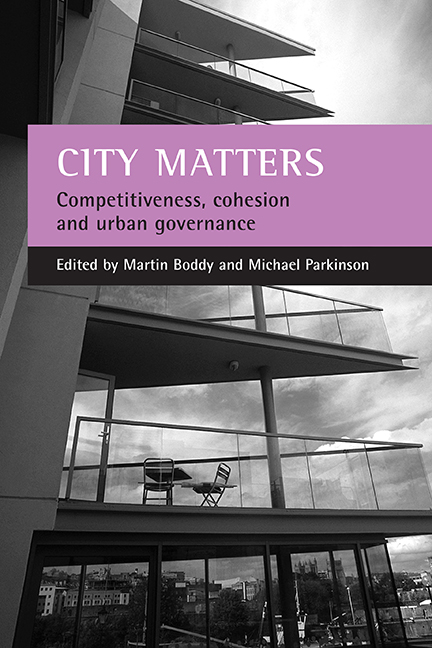Book contents
- Frontmatter
- Contents
- List of tables and figures
- Foreword
- Acknowledgements
- Notes on contributors
- one Introduction
- Part One Competitiveness, cohesion and urban governance
- Part Two Competitiveness and urban change
- Part Three Competitiveness, innovation and the knowledge economy
- Part Four Housing, property and economic performance
- Part Five Space, place and social cohesion
- Part Six Ethnicity, enterprise and social cohesion
- Part Seven Leadership, governance and social capital
- Conclusions
- Index
fourteen - The ‘good’ suburb as an urban asset in enhancing a city’s competitiveness
Published online by Cambridge University Press: 20 January 2022
- Frontmatter
- Contents
- List of tables and figures
- Foreword
- Acknowledgements
- Notes on contributors
- one Introduction
- Part One Competitiveness, cohesion and urban governance
- Part Two Competitiveness and urban change
- Part Three Competitiveness, innovation and the knowledge economy
- Part Four Housing, property and economic performance
- Part Five Space, place and social cohesion
- Part Six Ethnicity, enterprise and social cohesion
- Part Seven Leadership, governance and social capital
- Conclusions
- Index
Summary
Introduction
Along with other regional cities in the UK, Manchester grew during the Industrial Revolution into a major centre of manufacturing. However, employment in this sector declined at an increasing rate over the 20th century. Towards the end of this period, the city sought to reinvent itself as major regional centre for business, cultural and leisure services in the UK and indeed in Europe. This involved not only regenerating the city to make it an attractive place for high-level service industry professionals to work and play, but also promoting it as an enjoyable place for them to live. It is in this context that we raise the question of whether ‘good’ suburbs are ‘assets’ in maintaining and enhancing the city’s competitiveness, by helping it to attract and retain a highly qualified professional workforce. The research thus addresses one of the key themes running through the Cities Research Programme around the bases of competitive advantage and the role or urban assets.
The chapter begins with a brief overview of the changing employment patterns within the city before focusing on the financial and business services sector and the experiences of people working within it. This is followed by an examination of two long-established leafy suburbs, and in particular the development pressures they have come under as the city centre’s economy is revitalised, and the resistance offered by residents and others as they seek to preserve the exclusiveness of these neighbourhoods. The chapter ends with some observations about the lack of strategic planning for the future sustainable development of the good suburbs.
The study on which the chapter is based had two strands. The first examined the financial and business services sector located in Manchester city centre, and focused on six areas of professional employment: commercial law, accountancy, corporate banking and venture capitalists, actuarial services, architecture and creative design and advertising. These six areas were chosen because each had a significant presence in the city centre and each was widely acknowledged to be contributing to and benefiting from Manchester’s regeneration. Semistructured interviews were conducted with a senior partner or manager in 34 city-centre firms, large, medium and small, multinational and local, and with 10 key informants drawn from various professional and other organisations.
- Type
- Chapter
- Information
- City MattersCompetitiveness, Cohesion and Urban Governance, pp. 255 - 268Publisher: Bristol University PressPrint publication year: 2004



